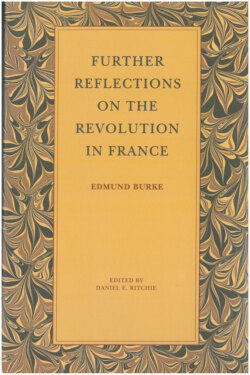Читать книгу Further Reflections on the Revolution in France - Edmund Burke - Страница 16
На сайте Литреса книга снята с продажи.
Оглавление4
AN APPEAL FROM THE NEW TO THE OLD WHIGS
August 1791
The events of the spring and summer of 1791 were climacteric for Edmund Burke. His increasing alienation from his fellow Whigs finally issued in a rupture between him and the party’s leader, Charles James Fox, during the debates on the Quebec Bill on May 6 and 11. It gradually became apparent that Burke was not simply alienated but isolated within the House of Commons: “not one of the party spoke one conciliatory word,” he wrote to his patron, the Earl Fitzwilliam, of the May 11 debate. On May 21, Burke’s A Letter to a Member of the National Assembly was published; it was dismissed by Fox as “mere madness.” During the night of June 20–21, Louis XVI and the Queen fled Paris, only to be captured and suspended from their royal functions on June 25. Burke wrote that British sorrow for the King was “real, and unaffected, and general” (Corr. Copeland 6:291).
The moment had arrived for Burke to explain his actions, not just as a political thinker, but as a member of the Whig party. In Thoughts on the Cause of the Present Discontents (1770) Burke had defined a political party as “a body of men united, for promoting by their joint endeavors the national interest, upon some particular principle in which they are all agreed.” How could the man who had changed the British attitude toward parties—from viewing them as conspiracies to considering them respectable and even necessary bodies for free governments—now act in a way that virtually guaranteed a split in his own party? The operative word in Burke’s definition is “principle,” and An Appeal is meant to show how the “new” Whigs under the leadership of Charles James Fox had departed from the principles of the “old” Whigs at the time of the Glorious Revolution (1688–89), the first group of men who could rightly be called Whigs.
Since much of An Appeal consists in Burke’s extracts from and comments on the trial of Henry Sacheverell (1674?–1724), a bit of background may prove useful. Sacheverell had virulently attacked Whigs, dissenters, and low-church Anglicans in pamphlets and sermons from the early 1700s. In 1709 the House of Commons declared that two of his printed sermons were “malicious, scandalous, and seditious libels, highly reflecting upon Her Majesty [Queen Anne] and her government, and the protestant succession.” The Whig ministers ordered his trial to be heard in Westminster, guaranteeing thereby that it would become a contest between Whig and Tory political principles. Sacheverell was declared guilty by the House of Lords in March 1710, but his sentence was so mild that he was felt to have won. The Whig ministry lost credit through the trial and was later replaced by the Tories.
An Appeal, which Burke chose to write in the third person, may be divided into seven parts: Burke’s separation from his party because of the Reflections and his attempt to speak on the Quebec Bill; his alleged inconsistency, for he had defended democracy and attacked privilege at other times in his career; his interpretation of the Revolution of 1688 and the trial of Sacheverell; the beliefs of the “new” Whigs, as drawn from the pamphlets directed against Burke; a true political understanding of “the people” as against a majority “told by the head”; an analysis of the extremism of the revolutionary mind; and finally, Burke’s own attempt to understand the development of the British constitution by eliciting political theory from political facts and human nature. This work is central to Burke’s understanding that humanity realizes its true nature through “art,” including such artificial institutions as historical constitutions.
